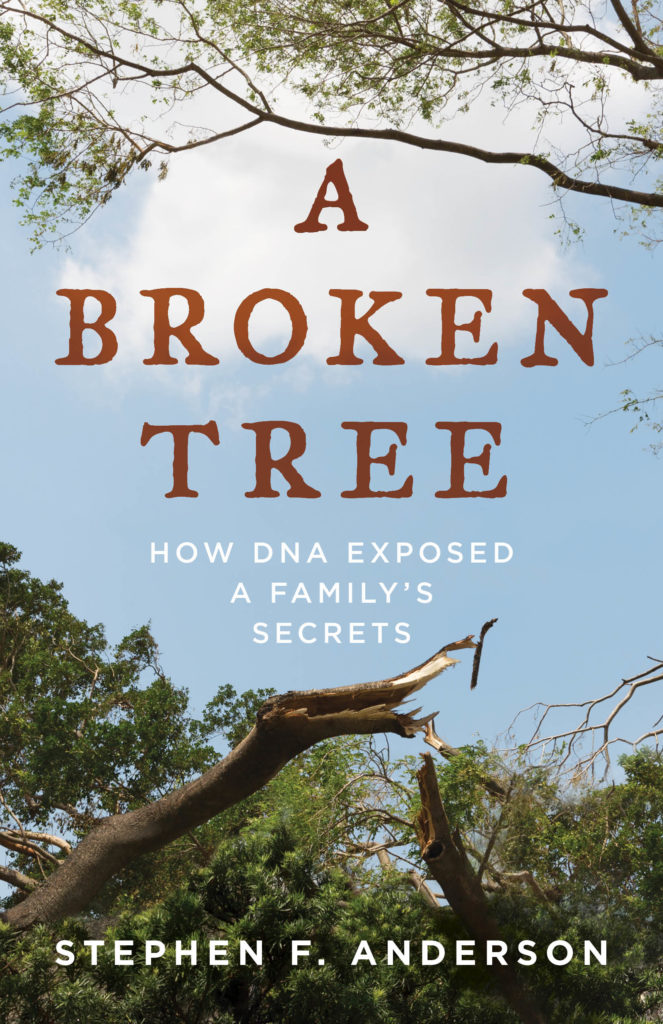A new memoir asks (and answers) the question: how many secrets can one family have?
It’s surely not hyperbole to say that “A Broken Tree: How DNA Exposed a Family’s Secrets”—a new book by Stephen F. Anderson—is the mother of all NPE (not parent expected) stories. It’s hard to imagine a more epic or stranger-than-fiction tale of misattributed parentage than this.
Anderson stared down a series of family mysteries and over decades employed DNA and oral history in an attempt to solve them. He describes his family of nine children as nothing like the “Leave it to Beaver” family he grew up watching on television. He knew his was different, but it took decades to learn just how different.
Because his mother, Linda, had little interest in settling down to raise kids and clean houses, and his father, Mark, a fire truck salesman, was on the road a great deal of the time, his older sisters took on much of the burden of caring for the younger children. There were rumors and whispers among the siblings of family secrets, but they were too disjointed and fragmentary to be understood. He turned to the person he most expected to have answers, but was rebuffed. He visited his oldest sister, Holly, to record stories about the family, and she refused to share a single recollection. Both intrigued and disturbed, he pressed her to reveal what she knew, but she was determined to say nothing until both of their parents had died. Her refusal only deepened his resolve to learn more.
Anderson learned to eavesdrop, and “parked” himself so he could hear what his aunts and older siblings were talking about. It was clear the family was hiding something, but the substance of the secrets remained a mystery. When Mark died, Stephen tried once again to nudge Holly into coming clean, but she was steadfast. She wouldn’t discuss anything until their mother was gone. His hopes of unraveling the mysteries were dashed when Holly died a few months before their mother did and took the secrets to her grave.
With Holly’s death, Anderson says, they lost a part of their family history, and he double-downed on his desire to know more. What he couldn’t have known as he resolved to get to the source of the rumors and whispers, however, was just how many family secrets he’d uncover or how twisted and tangled they were.
If anyone was well-equipped to sleuth a family mystery, it was Anderson. His avocation as a family historian, education in family and community history and library science, and his long career working in one of the leading genealogy companies—Family Search, International—gave him tools and knowledge others might not have had. Still, it was a challenge even to find the puzzle pieces let alone figure out how to put them together. And none of his education or work experience prepared him for the shock and emotional upheaval he experienced after he ultimately uncovered the truth.
Anderson and his brother Tim suspected that one of their siblings was an NPE. Their suspicions arose before autosomal DNA testing had become available, but they found an ally in an employee of private laboratory that offered other forms of DNA testing. In an effort to create a baseline—a genetic standard against which to measure the family relationships—they determined to get DNA samples from their parents. Their father died before they were able to accomplish their mission, but with help from a funeral director, they obtained a hair sample and were able to have it analyzed. Their mother provided a sample without hesitation. Anderson had no doubt that he was Mark’s son or that he and Tim were full brothers. They looked alike and both, especially Tim, looked like their dad. Still, he wanted to learn about his risks for hereditary diseases that ran in Mark’s family, so he submitted a sample of his own DNA.
When the results came in weeks later, Anderson recalls, his world was turned upside in one phone call. The good news was that he had no markers for the stomach cancer and diabetes he worried about developing. The bad news was that Mark was not his biological father. “Science and technology had stripped me of whatever sense of identity I thought I had,” he recalls. “I had no clue who I was.” He felt sucker punched. He couldn’t breathe and thought he might vomit. He was overwhelmed by feelings of rage, contempt for his mother, and the sense of having been betrayed. “It felt like my whole world was coming down around me,” he writes. He thought about having worried for so many years about the wrong hereditary diseases, all his genealogical research on a family to which he was no longer tethered, the way his father might react, and who his biological father might be.
Anderson couldn’t accept the results, and at the suggestion of the DNA lab, he gathered the hair chamber of his deceased father’s electric razor and had the shavings tested. He was gutted when the test results duplicated those of the initial test. He describes himself as having been on an emotional rollercoaster, but he soon found he was only at the beginning of the ride. To avoid a full-blown spoiler, let’s just say that Anderson wasn’t the only NPE in the family and that over time he was able to get to the bottom of most of the whispers and rumors he’d heard his whole life.
Don’t expect a literary memoir from “A Broken Tree.” It doesn’t boast an artful narrative structure or strive for deep character reflection and analysis. The author doesn’t aspire to crafting elegant prose or stringing graceful sentences. The text suffers in spots from repetition, and you may find it difficult at points to locate events in time and place. And yet it’s a compelling and extraordinary story of genetic disconnect, a page-turner in many spots. Readers are likely to be enthralled by the author’s experience and amazed—even inspired—by his determination to lay bare his family’s truth and his persistence. The book reads as testimony, and those who have had their own DNA surprises will nod in recognition, commiserating with the author at the same time that he validates their feelings about their experiences.


